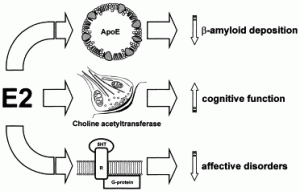Female patients with gynecological problems such as fibroids and endometriosis can be treated with leuprolide acetate depot (LAD) or Lupron. LAD suppresses ovarian function and decreases estrogen to the levels of postmenopause. In menopause estrogen levels show a natural drop. In this group the estrogen levels were chemically suppressed. The patients ranged in the ages 25 to 40 years of age-all of them well before the age of menopause. The researchers were able to observe the effects of estrogen on cognitive function without the brain changes associated with normal aging.
Dr. Barbara Sherwin, PhD, professor for psychology and obstetrics at Mc Gill University in Montreal stated that previous research has shown a connection between decreased estrogen and the deterioration of verbal memory. Taking estrogen during menopause can prevent this deterioration. The current study also showed a significant decrease in working memory and scores regarding mood in the women who are taking LAD.
Dr. Sherwin suggested also that some research points to a window of opportunity around the time of menopause where estrogen will protect.
But beyond that time, such as at the age of 65 or older, estrogen treatment does not provide these benefits. As shown in the Women’s Health Initiative study it may be detrimental.
Reference: The Medical Post, August, 22, 2006, page 45
Comment on Nov. 13, 2012: There is a big difference between conventional hormone replacement therapy (HRT) and replacement of hormones with bio-identical hormones. The former (HRT) is what was proven by the Women’s Health Initiative study to be detrimental to postmenopausal women; the latter (bio-identical hormone replacement) is what a lot of European women have done for decades and what has benefitted them tremendously without side-effects whatsoever. Inform yourself and read more about treatment of menopause under this link (Nethealthbook).
Last edited December 6, 2012






